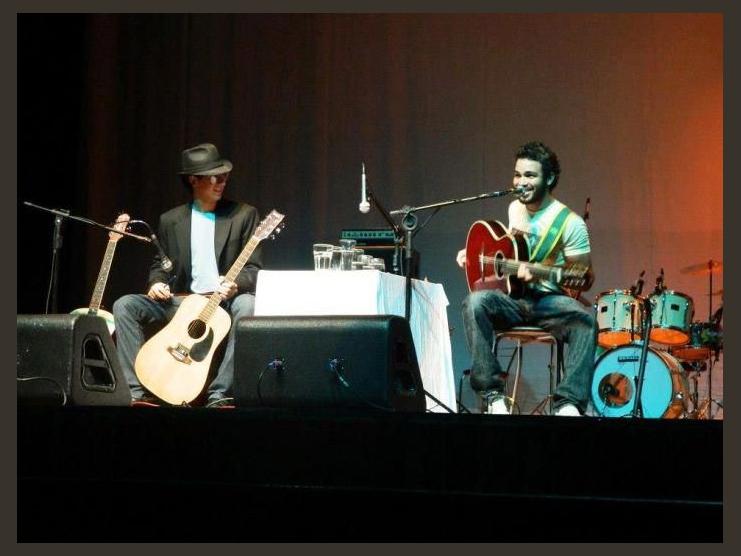 O Cafundó
O Cafundó
O Cafundó: A Journey Through the Depths of Brazilian Music
In the heart of the vibrant Brazilian music scene, emerged O Cafundó, a band that would captivate audiences with their unique blend of traditional rhythms and contemporary sounds.
Origins and Influences:
O Cafundó was formed in 2005 in the city of São Paulo, Brazil. The band's founders, singer and multi-instrumentalist Pedro Luís, percussionist Rodrigo Campos, and bassist Marcelo Cabral, shared a deep passion for the rich musical heritage of their country. They drew inspiration from diverse genres, including samba, forro, bossa nova, and Afro-Brazilian rhythms.
Musical Style:
O Cafundó's music is characterized by its infectious rhythms, soulful melodies, and thought-provoking lyrics. Their songs often explore themes of love, social justice, and the beauty of everyday life. The band's unique sound combines traditional instruments, such as the berimbau and pandeiro, with modern elements, such as electric guitars and synthesizers.
Discography:
Over the years, O Cafundó has released several acclaimed albums, including:
* Cafundó (2006)
* Nação Cafundó (2008)
* Rastilho (2011)
* Baile (2013)
* Fumaça (2016)
Challenges and Controversies:
Despite their critical and commercial success, O Cafundó has faced its share of challenges. In 2013, the band was accused of plagiarism in their song "Céu da Boca." However, the allegations were dismissed after it was determined that the melody was inspired by a traditional Brazilian folk song.
Members:
* Pedro Luís (vocals, guitar, cavaquinho)
* Rodrigo Campos (pandeiro, berimbau, percussion)
* Marcelo Cabral (bass)
* Bia Ferreira (vocals)
* Thiago Big Rabello (guitar, vocals)
* Marcos Suzano (drums)
Impact and Legacy:
O Cafundó has played a significant role in the revitalization of Brazilian music. Their innovative approach has helped to bridge the gap between traditional and contemporary sounds, reaching a wide audience in Brazil and beyond. The band's music continues to inspire musicians and audiences alike, proving that the depths of Brazilian music are inexhaustible.
In the heart of the vibrant Brazilian music scene, emerged O Cafundó, a band that would captivate audiences with their unique blend of traditional rhythms and contemporary sounds.
Origins and Influences:
O Cafundó was formed in 2005 in the city of São Paulo, Brazil. The band's founders, singer and multi-instrumentalist Pedro Luís, percussionist Rodrigo Campos, and bassist Marcelo Cabral, shared a deep passion for the rich musical heritage of their country. They drew inspiration from diverse genres, including samba, forro, bossa nova, and Afro-Brazilian rhythms.
Musical Style:
O Cafundó's music is characterized by its infectious rhythms, soulful melodies, and thought-provoking lyrics. Their songs often explore themes of love, social justice, and the beauty of everyday life. The band's unique sound combines traditional instruments, such as the berimbau and pandeiro, with modern elements, such as electric guitars and synthesizers.
Discography:
Over the years, O Cafundó has released several acclaimed albums, including:
* Cafundó (2006)
* Nação Cafundó (2008)
* Rastilho (2011)
* Baile (2013)
* Fumaça (2016)
Challenges and Controversies:
Despite their critical and commercial success, O Cafundó has faced its share of challenges. In 2013, the band was accused of plagiarism in their song "Céu da Boca." However, the allegations were dismissed after it was determined that the melody was inspired by a traditional Brazilian folk song.
Members:
* Pedro Luís (vocals, guitar, cavaquinho)
* Rodrigo Campos (pandeiro, berimbau, percussion)
* Marcelo Cabral (bass)
* Bia Ferreira (vocals)
* Thiago Big Rabello (guitar, vocals)
* Marcos Suzano (drums)
Impact and Legacy:
O Cafundó has played a significant role in the revitalization of Brazilian music. Their innovative approach has helped to bridge the gap between traditional and contemporary sounds, reaching a wide audience in Brazil and beyond. The band's music continues to inspire musicians and audiences alike, proving that the depths of Brazilian music are inexhaustible.